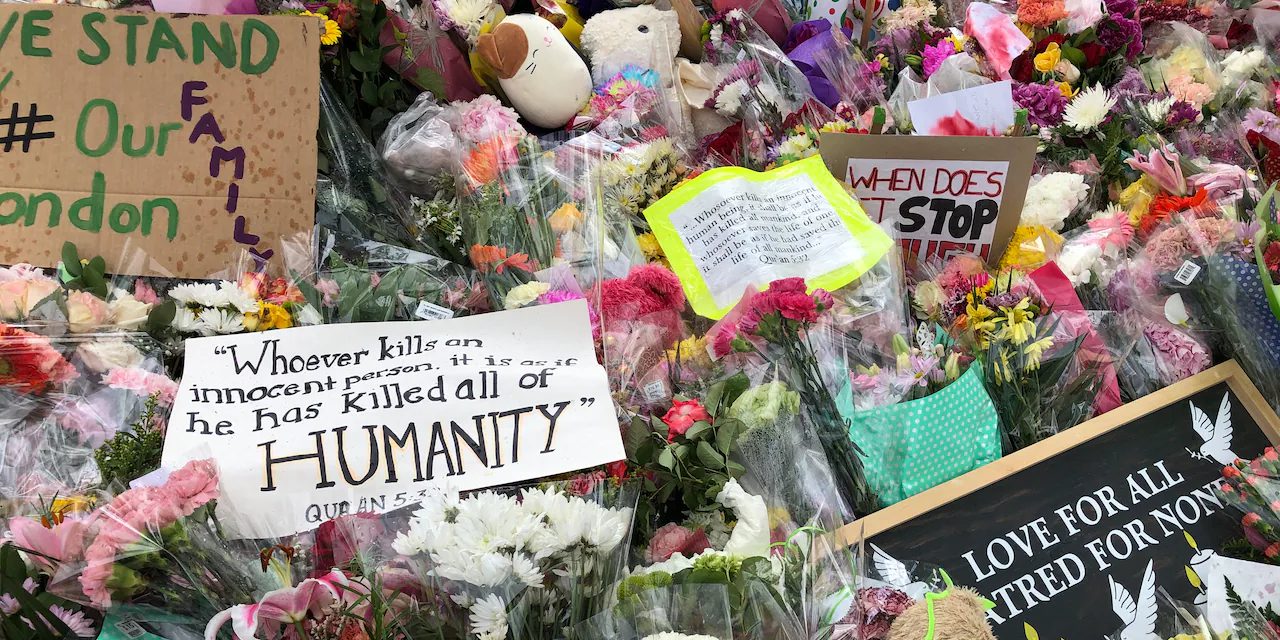Posted: June 10th, 2021
One-on-One and in the Crowd with London’s Muslim Community
it@adventistontario.org

London, Ontario, is home to approximately half a million people. It is a vibrant, lush suburb nestled in southwestern Ontario, about two hours’ drive west of Toronto. It is known as a tranquil, peaceful, uneventful city, an escape from the hustle and bustle of Toronto. However, June 6, 2021, will forever be remembered by Londoners as a day when that peace was ruptured. On the 6th, Islamophobia manifested as hatred in the loss of innocent lives. Beloved members of the Muslim community, Yumna Afzaal, 15, Madiha Salman, 44, Talat Afzaal, 74, and Salman Afzaal, 46, were out for a walk and callously killed by a vehicle in what police suggest is a hate-related crime.
What do you do when such a violent act is perpetrated in your city? The heinous act of Sunday, June 6, sent the Muslim community, London residents, the province of Ontario and the nation of Canada into collective mourning. “This could not happen here” were the words that rolled reluctantly from people’s lips. But it did. So what can the Seventh-day Adventist Church do in the face of such a tragedy?
I will outline a few steps here, which I will term the 7 “As” of contextual ministry.
-
Be aware:
The Bible encourages us to know the times and be aware of the community in which God has situated us. 1 Chr. 12:30 states: “And of the children of Issachar, which were men that had understanding of the times, to know what Israel ought to do.” A church that is not aware of its community will be unable to minister effectively to its community. We cannot be passive and let injustice, hate and acts of aggression go unnoticed. We must act. Thus, this tragedy in London, Ontario, needed a response.
-
Be active:
It is critical to respond, but it must be an informed response. Once the news media outlets broadcast this horrific act and its impact on the Muslim community, it was time for Seventh-day Adventists to respond. It is providential that the Ontario Conference of the Seventh-day Adventist Church has a Muslim Relations Director—Reynold Hazelwood. Within 24 hours of Conference president Mansfield Edwards being informed of the terrible loss of life, Pastor Hazelwood issued a letter to pastors from the Muslim Relations department. However, a letter cannot replace presence.
-
Be available:
After printing the letter, I prayed for an opportunity to meet with the Imam of the London Muslim Mosque. I had a full schedule for the day, but ministry is where the hurting people are, so I cleared my calendar. I consulted with my colleague and friend, Pastor Juan Carlos Atencio, who also pastors in the city. I knew that because the mosque would be the location of the 7 pm vigil and that Prime Minister Justin Trudeau and the opposition leaders would be attending, I needed to get to the mosque before 4:30 pm. Upon arrival, the place was barricaded, and the news media were already setting up. Police were everywhere, and the only parking available was at a nearby townhouse complex. What to do?
-
Be adaptable:
The Bible tells us to be “…wise as serpents, and harmless as doves” (Matt. 10:16). I knew I needed to gain access, so I parked in the townhouse’s private parking, trusting that since I was on God’s business, He would keep my car from being towed or ticketed. Furthermore, I wore a Seventh-day Adventist church shirt, with the logo and church name on the front and on the back the words “…Because we care”. I approached the mosque’s gatekeepers. I had the letter in hand and greeted them, saying, "As-Salaam-Alaikum," the Arabic greeting meaning "Peace be unto you.” I then stated that I was there on behalf of all Seventh-day Adventists in Ontario. I had a letter to deliver to Imam Aarij Answer, the interim Imam and Islamic Education Coordinator at London Muslim Mosque. They let me through.
-
Be attentive:
I walked slowly across the yard into the mosque, my first time in any mosque. There were secret servicemen everywhere. The vigil was starting in roughly two hours, and people were busy preparing. I was greeted warmly by a Canadian Muslim Council of Canada member. I expressed my sympathies to him on behalf of the Seventh-day Adventist community in London and stated my desire to deliver the letter from the president of the Seventh-day Adventist community in Ontario. He immediately contacted the Imam and assured me that the Imam would be out to see me. However, after a 20-minute wait, he updated me on the Imam’s availability and said either he could take the letter, or I could wait a bit longer. I politely stated that I would wait. However, this time, I sent a text message to Elder Clara to pray that God grant me the right words to share when the Iman arrived.
-
Be affirming:
Finally, Imam Aarij arrived, and I greeted him with the limited Arabic vocabulary I possessed. I was finally one-on-one with the leader of the Muslim community in London. What should I say? But maybe the better question was, who should I be? My disaster response chaplaincy training and discipleship training have taught me that presence speaks more effectively than words in deep, complex grief situations. So I looked the Imam in the eyes and said, “We, the Seventh-day Adventist community, grieve with you. We are here to support you. How can we help?” With tears in his eyes, the Imam responded: “Your support and presence here are overwhelming. We have all the volunteers we need. However, your support means a lot to us. Just remember, everyone has the right to live freely and safely in Canada, and this senseless murder should be called for what it is.” I affirmed and supported his call for Canada to be a safe place for all, regardless of religion, ethnicity, gender or sexual orientation. I knew the Imam needed to rush back to planning and preparation, but I wanted an opportunity to connect more, so I asked for a business card.
-
Be authentic:
I was there out of genuine concern for his loss, the loss of the Muslim community, the loss of the London community. Then, it happened—a moment of personal connection. Neither of us had business cards, so he said he would text me his cell number and email address to connect. I started to share my phone number of 416, which is not the area code for London (519). I paused to explain that I had a Toronto-based number, as I live there, but I work in London. The Imam smiled and said he, too, has a 416 number and asked where in Toronto I lived as he too lived there.
I left the mosque feeling filled. My car was safe. I returned home and exclaimed, “Surely, the Lord, God, He is Lord!” Later that evening, I met Pastor Juan, and we drove to attend the vigil. It was cooler outside. There were thousands of people present of all hues, faiths and ethnicities. The program was both heart-stirring and a celebration of Muslim courage. In the crowd, I was pleased to see some members of the local Seventh-day Adventist Churches; they were present to support a hurting humanity, who happened to be Muslim. So what more can we do?
Well, I texted the Imam this morning to inform him that I was a disaster response chaplain and was available to do debriefing sessions free of charge to his congregants. Furthermore, I told him that we are praying for him. Also, our Religious Liberty department can join our Muslim brothers and lobby the government of Canada for a summit to be convened on Islamophobia in Canada. However, on a personal level, each member can be a voice against micro-aggressions against Muslims and all oppressed communities, helping fulfill the mandate in Micah 6:8. “He has told you, O man, what is good; and what does the Lord require of you but to do justice, and to love kindness, and to walk humbly with your God” (ESV).
Chaplain Charles Skeete, MTS, BCC (College of Pastoral Supervision and Psychotherapy), Endorsed NAD Community Chaplain

